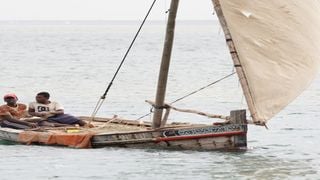
Fishermen in Lamu venturing into the Indian Ocean. The county government will soon start operating the Faza fish cold storage plant.
| Kalume Kazungu I Nation Media Group.Lamu
Premium
Foreign vessels a headache for artisanal fishermen in Lamu
Artisanal fishermen in Lamu are a worried lot as foreign trawlers continue to fish in deep and shallow fishing areas in the region.
Local fishermen, especially on the northern shores of the Indian Ocean, from Kiwayu to Kipungani and Mpeketoni on the Tana River County boundary, complain that trawlers believed to be from China, Spain and South Korea have been spotted operating illegally in shallow waters at night.
The ships, they say, destroy the fishing gear of locals and damage the sea floor and coral reefs.
Lamu Beach Management Units (BMU) network chairman Mohamed Somo said local fishermen had seen declining catches in recent years.
Trawlers, they said, do not stick to designated areas, adding that areas such as Pezali, Pate, Mwamba wa Hasssan, Mwamba wa Yeye, Ziwayu, Zinyika, Kizingitini, Tenewi and Kipungani were the most affected by destructive trawler activities.
Kenyan law permits trawler fishing starting at five nautical miles but local fishermen lamented that many vessels were fishing as close to the shore as two nautical miles.
In previous years before illegal trawler fishing peaked in Lamu, Mr Somo said, most local fishermen would return home with a bounty of at least 90kg of fish, all caught within five nautical miles into the Indian Ocean. Now they catch less than 40kg.
“During the day, trawlers are in the deep seas but at night, they invade the shallow fishing space which we depend on for our artisanal fishing business,” he said.
“The trawler fishing technique is destroying fish breeding grounds and corals used by fish as breeding sites.”
He urged the fisheries officials to end trawler fishing in Lamu.
“The trawlers mostly target prized populations of prawns, lobster, crabs and yellowfin tuna but, unfortunately, they end up scooping out everything from the ocean, including young immature fish, and hence destroying their population in the process,” he said.
“This has seen a general reduction in catch among local fishermen in recent days.”
Twawy Sharif, a BMU member in Kizingitini, blamed the national government for subjecting local fishermen to too many restrictions as foreign fishing vessels operate freely on the Kenyan coast.
Trawlers, he said, are responsible for over-fishing in most areas in Lamu, a situation that has led many fishermen to quit the business.
“Many families depending on fishing will suffer if trawler fishing activities continue in our ocean. We have already witnessed a fall in catches. These trawlers also take all the best fish and leave us with poor quality ones,” he said.
Fisherman Abdallah Mahadhi questioned why the government continues to license foreign vessels when it lacks the capacity to monitor their activities.
Foreign trawlers, he said, had also taken advantage of poor surveillance to continue fishing illegally.
Hashim Lali, the chairman of the Kiwayu Beach Management Unit in Lamu East, explained that the trawlers had pushed most of his colleagues out of business.
“Apart from depleting the fish stock, these foreign ships destroy the nesting areas. Every time they move secretly from the deep seas to fish illegally in the shallow waters, they end up destroying our nets,” he said.

Lamu Island fishermen chair Abubakar Twalib. He is calling on trawlers to be stopped or regulated in the Indian Ocean in Lamu.
“This has discouraged many of us here, and they have left the trade to seek other means of earning an income. As you can see, many fishing boats belonging to local fishermen are parked in the yards.”
Speaking in his office, Lamu Deputy Governor Abdulhakim Aboud, who is also the county executive for Fisheries, acknowledged that Lamu illegal trawler fishing was a big problem.
Kenyan waters, he noted, are virtually unpoliced, with fisheries personnel in places like Lamu lacking patrol boats to monitor activities at sea.
He said Kenya is still losing millions of shillings annually to foreigners who fish in its waters illegally.
He urged the national government to work closely with county governments to curb illegal, unreported and unregulated fishing in Kenyan territorial waters.
Commercial bottom trawling, he said, had undermined biodiversity and local fishermen’s productivity.
“Trawler fishing is a challenge in Lamu and all this is because we lack proper vessel monitoring systems at sea. As a result, trawler owners, mostly international, have taken advantage of the situation to encroach on our territorial waters,” he said.
“There’s a need for the county governments to be empowered to enable them to directly monitor these huge fishing vessels. Once we create a formidable surveillance system, illegal fishing will be a thing of the past.”
He said it is not easy to identify which trawlers are licensed because that is the national government’s responsibility.
Records from the county fisheries department show that Lamu produces at least 3,500 metric tonnes of fish annually.
But fisheries officials warn that the yield is likely to decline if illegal trawler fishing is not stopped.
This story is part of a Nation.Africa reporting series on the state of the fishing sector at the Coast region. Also read:





